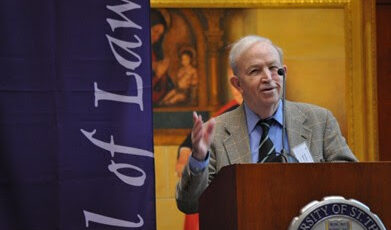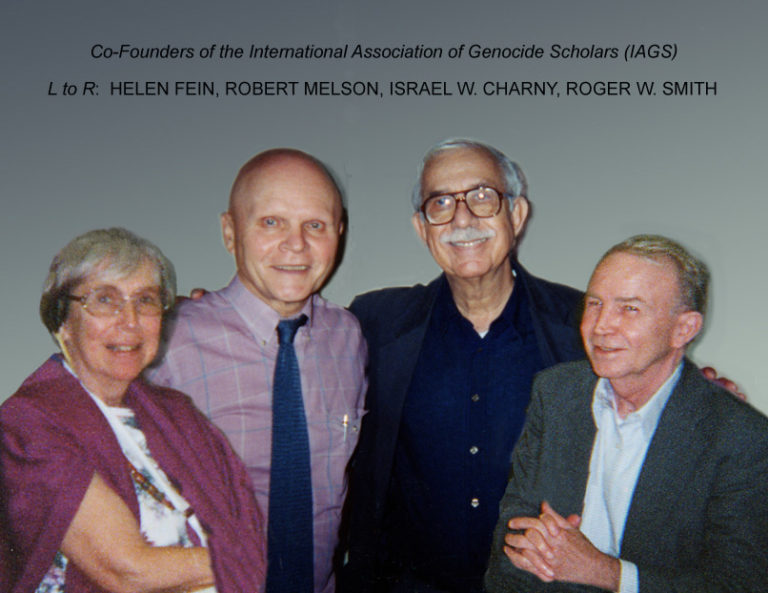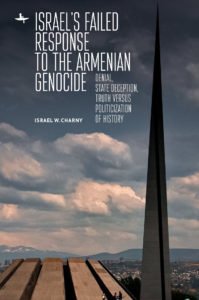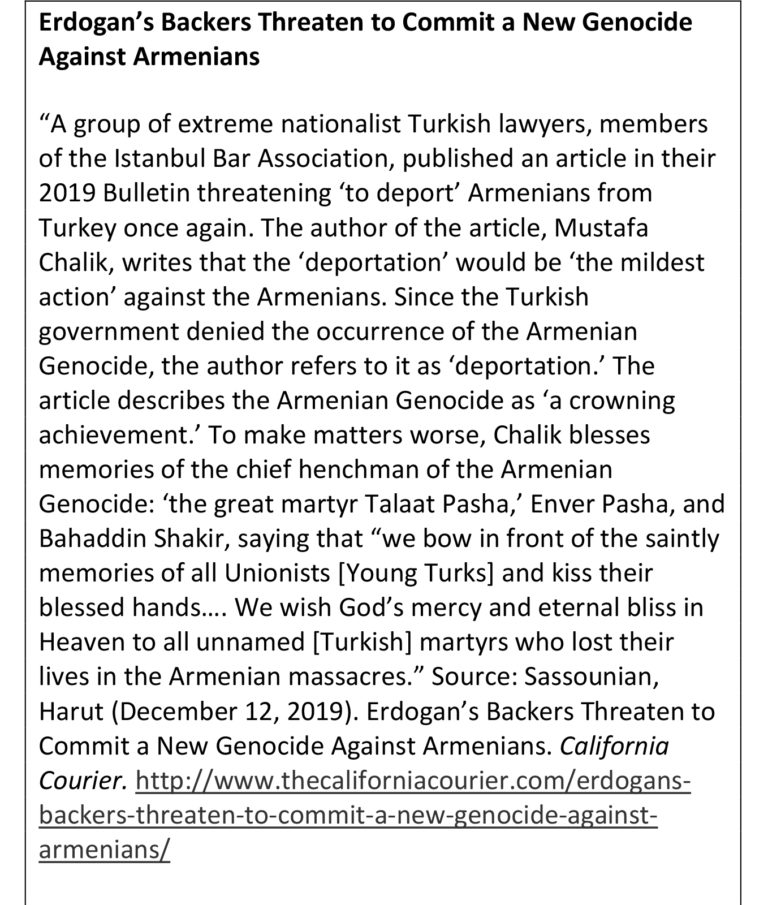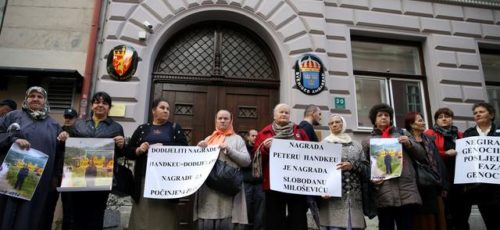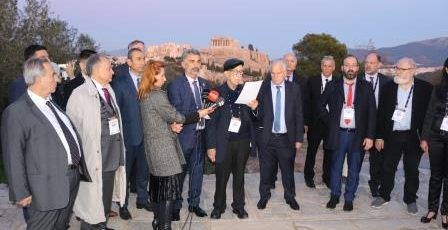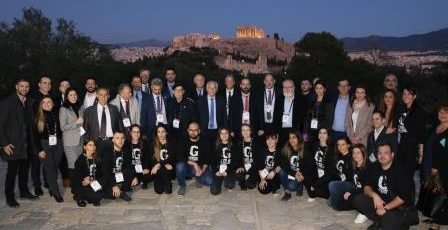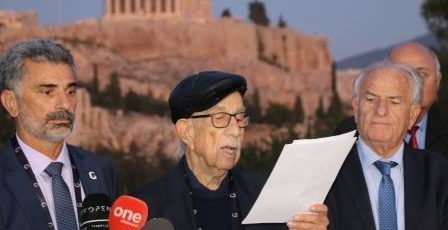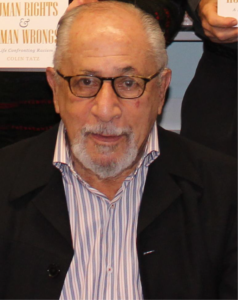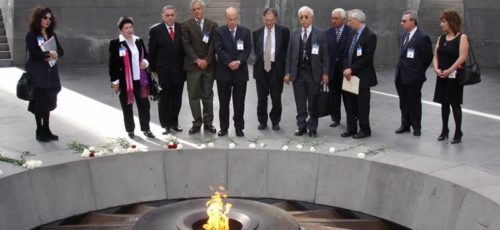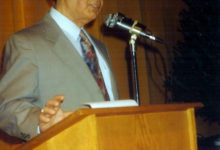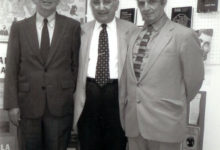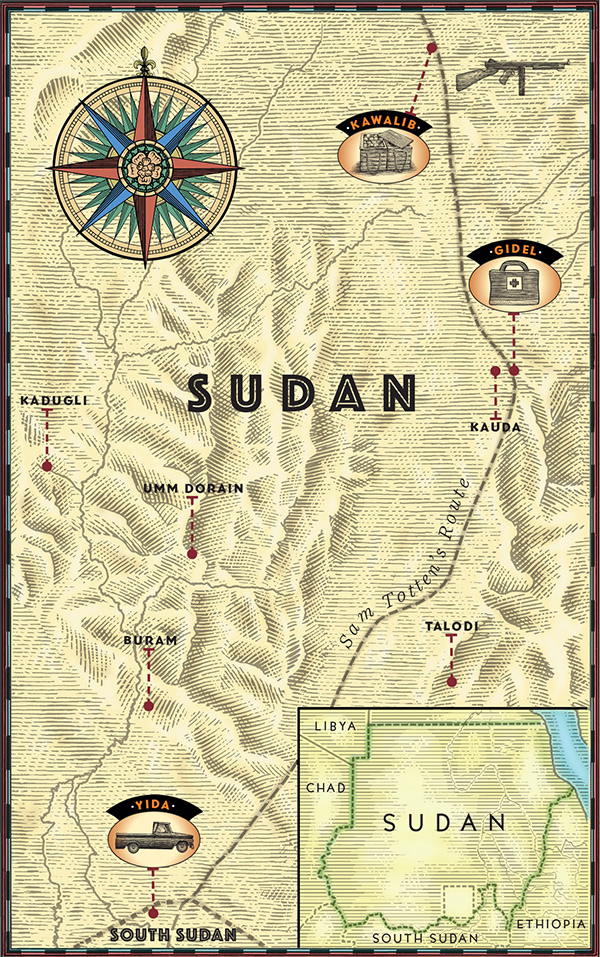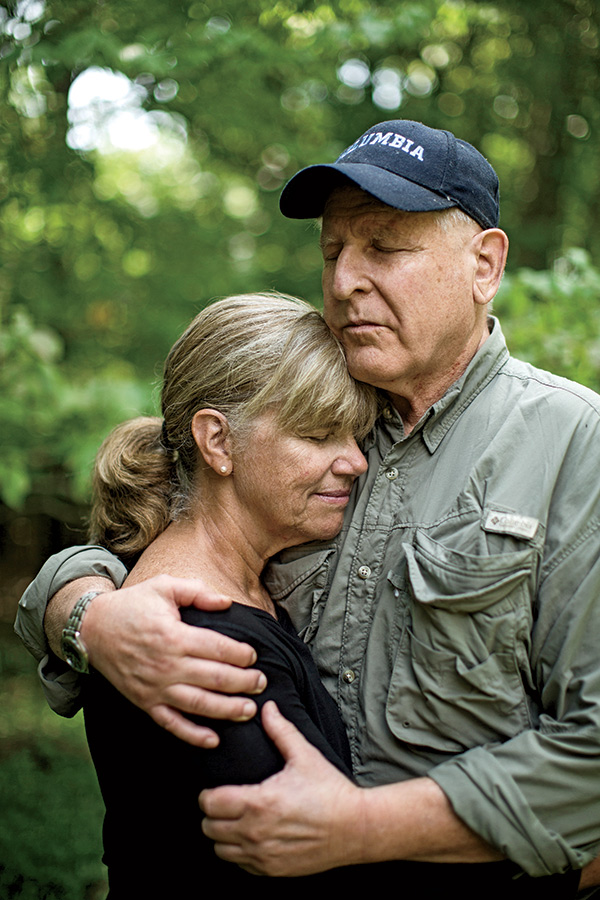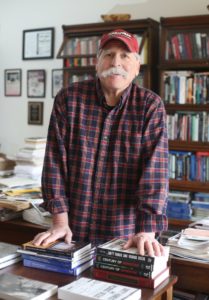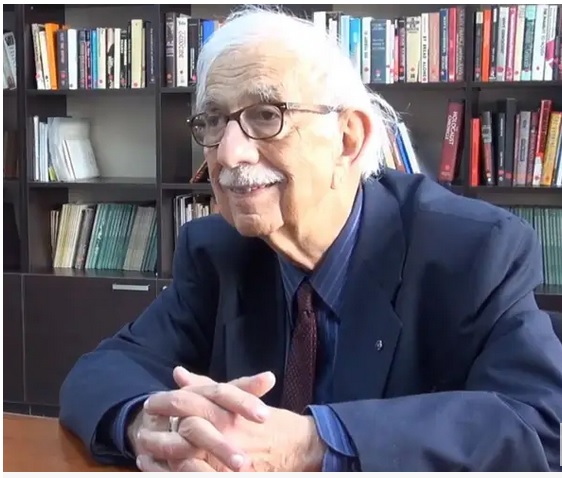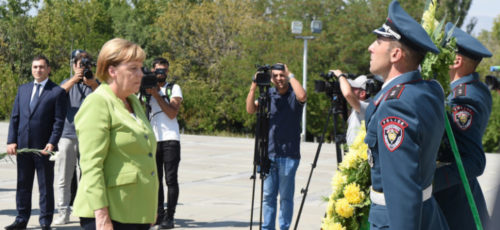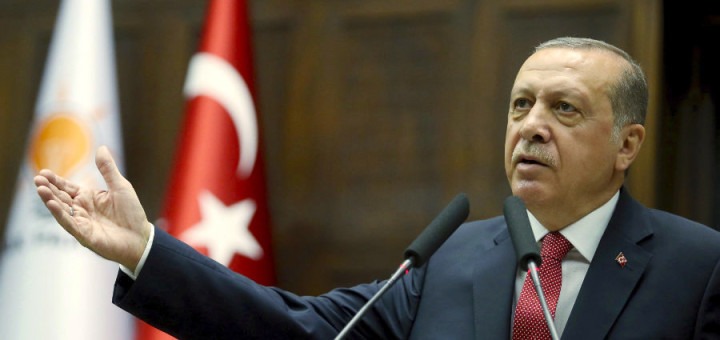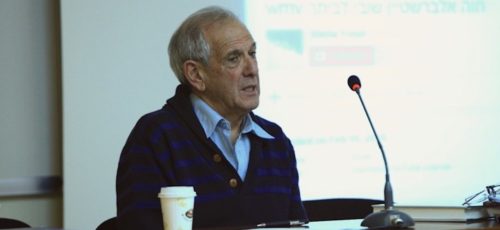A Special Legacy Article
by Israel W. Charny
The following is the complete article and contains materials that have not been included in the edited version published by Genocide Studies and Prevention (GSP) – Volume 17, No. 3, pp. 1-18. The major difference as noted in the journal article (p.16) is that a fuller description of the history of the development of the International Network of Genocide Scholars (INOGS) is included and especially the story of the considerable efforts of their journal, the Journal of Genocide Research (JGR), to minimize the significance of the Holocaust. Additionally, the present complete article includes a good number of references that were omitted in the journal version.
This complete article will be published on the website of the Institute on the Holocaust and Genocide Jerusalem (www.ihgjlm.com), and the blog of Genocide Watch (https://www.genocidewatchblog.com/post/israel-charny-a-personal-history-of-genocide-studies).
Part One: The Genesis of a New Discipline
This review came about in response to a remarkably inaccurate and misleading Wikipedia entry on genocide studies in which the unnamed author attributed to two well-known scholars virtually entire ownership of the origins of the whole field.[1] The apparently grandiose and certainly factually incorrect article utterly amazed me and several other colleagues, and we agreed that a revision had to be prepared.
Fortunately, in time the inappropriate claim of ownership of the field was replaced by a new entry on Genocide Studies in Wikipedia, but the spark for recording a meaningful summary of the beginnings of our field had been lit in me and I was in to writing about the early history of our field. Before long it also became clear to me that I had a lot more wanting to be said than would have fit the space of a Wikipedia entry, and I decided to continue with a book chapter-length essay. I write much of this essay in the first person given that I was one of a very small number of participants in the earliest unfolding of Genocide Studies in general and the organization of IAGS specifically. I realized that I personally had been so deeply involved in the very beginnings of Genocide Studies that my writing was necessarily autobiographical and should be identified as such in its title and subject to critical review as such.
I am happy to note that this manuscript has also been reviewed by two very dear colleagues, veteran and outstanding genocide scholars, Samuel Totten and Gregory Stanton.
Totten is a well-known specialist in several areas of genocide studies,”[2] including field based interviews of scores of survivors of the Darfur genocide and the genocide of attrition in the Nuba mountains,[3] also the 1994 Rwandan genocide;[4] the prevention and intervention of genocide; and the development of one of the most popular texts used in genocide courses around the globe (Centuries of Genocide – five editions to date)[5]; food as a weapon of war/genocide; and the roles of bystanders.[6]
The second critical reviewer of this manuscript is the veteran genocide scholar and leader, Gregory Stanton, who was my vice president when I was president of IAGS, and who then succeeded me as president of IAGS. Greg is the founder and president of Genocide Watch, an invaluable monitor of developing world events, and has contributed great deal to awareness of stages of development of genocide. [7] (Fuller descriptions of the works of both will follow later.)
Nonetheless, the review is clearly a statement of my personal experiences and views, and insofar as basic inaccuracies or unfair analyses appear, the responsibility is entirely mine. My greatest concern is that I have omitted important scholars inadvertently or selfishly, missed or minimized important contributions, or made statements that are unfairly embarrassing to a colleague, and as I said in all such instances the responsibility is fully mine.
The Bizarre ‘Credit-Grabbing Entry’ in Wikipedia
As noted, this review of the early history of the development of Genocide Studies was written initially in response to an astonishingly and sorely incomplete Wikipedia entry that essentially attributed the whole development of the field to two genocide scholars whose presence was not at all registered by any of us who were busy with launching the new field.[8]
Thankfully, the introductory statement in the astounding entry in Wikipedia was not without merit in attributing the basic origin of the field to the work of Raphael Lemkin, a Polish legal official himself a Holocaust survivor who escaped the Nazis but lost virtually all of his large family, and who is correctly credited with creating the term “genocide.”[9]
It was also correct in identifying the Holocaust as initially the “primary subject matter of genocide studies,” and Lemkin’s definition of genocide as both killing and physical destruction as well as “cultural genocide” is presented accurately. The emphasis and correct explanation of the concept of “cultural genocide” is especially to the credit of the authors who quote Lemkin that such genocide is “the annihilation of a group’s culture even if the group themselves are not completely destroyed.”[10] Regrettably, and in my opinion very incorrectly, many scholars of genocide have gone on to insist on exhuming actual bloody bodies before they would even consider that an action or a policy intending to destroy a culture’s continuity could be considered genocidal.[11]
However, following the opening on Lemkin, the Wikipedia entry deteriorated radically, beginning with the total omission of any and all of the seminal works in the English language that launched genocide studies 35 years later at the end of the 1970’s and in the beginning of the 1980’s.
For many years after the revealing and authoritative book by Raphael Lemkin as World War II was coming to an end, in which he presented for the first time the word-concept “genocide,” no work on genocide appeared in the United States.[12] There was one work in English, The Crime of State, by Pieter Drost, published in Holland in 1959,[13] but it did not receive much of a response in the U.S. as far as we know. To my amazement, it has recently come to my attention that we Americans who were to be responsible for generating the new field of Genocide Studies were preceded quite significantly by a “Congress for the Prevention of Genocide” which was the second Congress of the International Society for the Prevention of Crime (La Société Internacionale de Prophalylaxie Criminelle) in July 1967 in Paris![14] Due to space constraints I am unable to identify all of the European participants who are named in the small amount of material about the Congress that has reached me, but I am pleased to be able to identify three of the participants whose work was otherwise known to me: the American professor of social psychology, Otto Klineberg, the French historian Leon Poliakov, and an Israeli criminologist, Benjamin Mendelsohn, who is identified as the “‘father’ of victimology.”
In the late 1970’s and early 1980’s a quantum leap was made vis-a- vis the publication of four major books. Together with Lemkin’s foundational work, these books became the intellectual foundation and driving force for the development of the new discipline of genocide studies:[15]
- Irving Louis Horowitz, Genocide: State Power and Mass Murder, 1976[16];
- Leo Kuper. Genocide: Its Political Use in the Twentieth Century, 1981[17];
- Israel W. Charny. How Can We Commit the Unthinkable: Genocide, The Human Cancer, 1982[18]
- Jack Nusan Porter. Genocide and Human Rights: A Global Anthology, 1982[19]
It is also appropriate to note here that just two years earlier, Helen Fein, who a decade later was to become the first president of the International Association of Genocide Scholars (IAGS), authored an outstanding comparative study of the fates of the Jews in the different countries overtaken by the Nazis, and while her book is devoted solely to the one genocide of the Holocaust, it is in effect a groundbreaking comparative study of the genocides of the Jews in the many countries the Nazis occupied, and very much laid a groundwork for thinking about comparative studies of genocides in general.[20]
Three of the pioneering authors noted above, Kuper, Horowitz and Charny, were now invited by Amnesty International to a meeting in Amsterdam in 1982 to present the newly emerging concept of genocide; and it was from this meeting that Martin Ennals, then the Secretary-General of Amnesty who had led it to worldwide recognition and no less than a Nobel Prize, was recruited by Leo Kuper to leave Amnesty in order to head a new organization, International Alert, based in London. Ennals did so because he felt that it was time for Amnesty to move from the concern with individual prisoners of conscience to the subjects of large-scale group destruction, but Amnesty decided not to undertake this expansion notwithstanding the presentations made by Kuper, Horowitz, and Charny. Sadly, Ennals was to die unexpectedly a short time later, and although there was a period of several years of activity by International Alert, it failed in its efforts to materialize into the organization envisioned by Kuper.
Briefly about the four authors:
Irving Louis Horowitz was a famed sociologist and professor at Rutgers University, and also the publisher of Transaction Publishers, which in the years that followed became a powerhouse for new and varied books on genocide such as the monumental studies of the demographics of genocide by University of Hawaii political scientist, RJ Rummel,[21] and the book recognizing the first generation of pioneers of genocides studies edited by Samuel Totten and Steven L. Jacobs.[22]
Leo Kuper, a professor at UCLA, was also a sociologist. He was originally a South African who had published an earlier seminal work on polarization between warring ethnicities in Africa.[23] As noted, in 1981-1982, Kuper published his foundational work on various genocides in the 20th century and on understanding genocide as a process,[24] and followed up in 1985 with a second volume on the prevention of genocide by the international system.[25]
Israel W. Charny, an American clinical psychologist, moved from Philadelphia in 1973 to live in Israel where he completed his major work on the victims, bystanders and perpetrators of genocide.[26] In this book, Charny together with Chanan Rappaport, then Director of the Szold Institute in Jerusalem, Israel’s National Institute for Research in the Behavioral Sciences, formulated the concept of a Genocide Early Warning System (GEWS).[27] The concept earned commendations far and wide including from the United Nations, U.S. State Department, the Chancellor of Germany, the Prime Minister of France, and the New York Times.
|
SAMPLE RESPONSES TO GENOCIDE EARLY WARNING SYSTEM
WILLIE BRANDT, Bonn, Prime Minister of Germany: “Your plan to develop concepts and proposals for disseminating the information of a genocide and human rights data indeed sounds fascinating. I would like to assure you that I am ready to give you my moral support.”
PIERRE MENDES FRANCE, Paris, Prime Minister of France: “I congratulate you with much warmth on your initiative and undertaking to establish a center against genocide and for the protection of human rights which you propose to establish in Jerusalem.”
|
When Charny would be asked how he became so involved in the study of genocide, he would tell the story that five years after receiving his Ph.D. in clinical psychology he was eligible to undergo an evaluation of his knowledge and clinical skills in order to qualify for the highest accreditation of the profession, which was certification as a “Diplomate” by the American Board of Professional Psychology (ABPP). When he went to sleep on the evening of the day on which he received the happy news that he had qualified, he dreamt a graphic dream about the horrors of the Holocaust and awoke with a pounding question, “How could they have done it?” He then realized that although he was now certified as a full-blown expert on the psychology of human behavior that he had never been taught a thing about the extent of human beings’ evil and destructiveness, and he resolved that he would devote much of his professional life to this issue.
Jack Nusan Porter, also a sociologist, published the first anthology of genocide studies in 1982 which included his ambitiously creative effort to describe the conditions under which genocide was most likely to erupt.
The First International Conference on the Holocaust and Genocide in 1982 Despite the Fierce Opposition of Turkey and Israel
It was also in 1982 that “The First International Conference on the Holocaust and Genocide” took place in Tel Aviv. The conference was originated by Israel Charny, beginning in 1979, without any organizational context or backing whatsoever, simply with letters of invitation to known human rights leaders, communication specialists, and representatives of various ethnic groups, such as Jews, Armenians, Ukrainians, Hungarians and the Bah’ai, who had suffered genocide or the threat of genocide. Charny was joined by Shamai Davidson, MD, a psychiatrist-psychoanalyst who directed a major mental health hospital in Israel and himself specialized in treating with great sympathy Holocaust survivors. Iconic Holocaust survivor, Elie Wiesel, who was later awarded the Nobel Peace Prize, joined Charny in designing the historic conference on genocide, and accepted the role of president of the conference.[28]
The conference took place only in Tel Aviv following the withdrawal of Yad Vashem in Jerusalem where the conference had been planned to open – but it did take place very successfully. Over the years several scholars and publications have mistakenly stated that the conference was canceled because of furious efforts by both Turkey and Israel to cancel it,[29] but in fact a quite substantial conference with 300 participants did take place. In fact, this conference has been hailed many times as a decisive historical event in the development of Genocide Studies as well as a triumph of academic freedom.[30]
As the date of the conference approached, a political brouhaha erupted when Turkey put pressure on Israel to suspend the participation of the Armenian scholars of the Armenian Genocide who were scheduled to present.[31] The conference leaders – including Elie Wiesel before he resigned – absolutely refused to cancel the Armenian speakers, but subsequently, the State of Israel made many efforts to have the conference canceled altogether. See the series of reports in the New York Times at the time[32]:
|
Headlines of Five Stories in New York Times Tracking the Drama of Threat
to the Conference by Turkey and Israel, but the Conference Does Take Place Successfully
1. Special to the New York Times, June 2, 1982
“Parley on Genocide in Doubt, Pressure by Turkey Reported”
2. Special to the New York Times, June 3, 1982
“Israel Set to Oppose Parley After Threat to Turkish Jews”
3. Associated Press, June 4, 1982
“Genocide Seminar with Armenians to Go Forward”
4. Special to the New York Times, June 5, 1982, by Marvine Howe
“Turkey Denies It Threatened Jews on Tel Aviv Parley on Genocide”
5. Special to the New York Times, June 22, 1982
“Genocide Seminar, Opposed by Israel, Opens”
|
The conference was wounded by the powerful attacks of the Israeli government whose official diplomatic representatives contacted known registrants virtually to order them in the name of the State of Israel not to come, and then even called people who had already arrived in Tel Aviv to inform them that the conference had been canceled when it had not, and also brought heavy pressures to stop incoming financial support such as convincing one substantial donor to cancel his check before it cleared. But when called by the New York Times, Charny announced that the conference nonetheless would take place and added that there would be a conference even if no more than 10 people were in attendance — thus invoking the traditional Jewish concept of a minyan of 10 people that is needed to conduct a full prayer service in the synagogue.
Among the scholars of Holocaust and genocide and human rights who were invited to conduct two-day pre-conference workshops and/or to serve as Section Leaders at the conference were Leo Kuper; distinguished psychiatrist Robert Jay Lifton, author of many studies including one of the Nazi doctors in the Holocaust; and Richard Hovannisian,[33] UCLA professor of history and Armenian studies (whose book following the conference was referenced earlier) who many described as the intellectual doyen of the Armenian community in the U.S., and who headed up the delegation of Armenian scholars at the conference which also included the fabled Armenian scholar, Vahakn Dadrian, in what was , according to their excited descriptions, the first ever international academic presentation on the Armenian Genocide. I remember vividly how some of the Armenian speakers were so nervous – as if in their post-traumatic torment they feared that Turkish agents or their representatives would intrude on the scene – that they kept asking why there was not more visible police protection.
Sadly, a good number of other designated Section Leaders who had indicated they would participate dropped out, including Holocaust scholar, Yehuda Bauer, who later apologized that he was wrong, and law professor Alan Dershowitz who simply didn’t show up.[34]
The most dramatic exit from the conference was no less cut by our own conference president, Nobel prize-winning Holocaust survivor and writer-philosopher, Elie Wiesel. He had enthusiastically accepted my original invitation to be president of the conference, and in the early stages of Israel’s efforts to appease Turkey by removing the subject of the Armenian Genocide from the conference, Wiesel had stayed firm with the rest of us in his refusals to do so. But then when the government of Israel put its greatest influences to work – including no less than the Prime Minister and Foreign Minister- and insisted that Turkey had threatened Jewish lives and that Jewish persons would be at risk if the lectures on the Armenian Genocide were delivered, Wiesel understandably caved in. Surprisingly to many people, although I was frustrated and certainly worried about the success of the conference, I largely understood and even sympathized with Wiesel.[35] I have been criticized by some colleagues for ‘going soft on him,’ but I really do understand how Wiesel, first and foremost a real life survivor of the hell of the Holocaust, and a truly dedicated Jew, could not go against the instructions of his heroes, the leaders of Israel, or take the risk of contributing to the deaths of Jews. Nonetheless, I have to report that Elie Wiesel did go on to behave very badly, and even nastily in efforts to have the conference canceled in its entirety. (I also describe in my book how Wiesel and I reunited once again, quite warmly, but basically our relationship never really recovered and we ended moving apart once more.)
The big question was whether there were or were not any real risks to Jewish lives either in Turkey itself or by way of ending the opportunity of Jews to escape from Iran and Syria through Turkey. These were the two threats that had been conveyed to us by the Israel Foreign Ministry. At first the language was about ‘threats to Jewish lives’ — the implication being threats to Jews living in Turkey. Subsequently, references to Jews in Turkey seemed to stop but were replaced with even greater passion by the representatives of the Israeli Foreign Ministry with statements that the escape routes of Jews from Iran and Syria to Turkey would be blocked and would lead to their possible deaths. It was an enormous responsibility for me and us now to evaluate these threats as we made our decisions, step by step, to resist the government’s demands. I consulted with many people, including my asking for the assistance of the US State Department who responded graciously and helpfully. After a few days of studying the matter, they conveyed to me their judgment that there was little risk.
The US State Department judgment was also my judgment, with several other colleagues concurring. Thank God, I was right, but it was only much later in these recent years, that I discovered what I describe in my recent book, Israel’s Failed Response to the Armenian Genocide[36]) based on the previously secret documents of Israel’s Foreign Ministry, that Turkey actually never made such threats! It was Israel that manufactured the threats in order to cover its sycophantic collaboration with Turkey’s demands to evade and hide the history of the Armenian Genocide its forebears had committed.
The Institute on the Holocaust and Genocide in Jerusalem – the First Institute on Genocide – and the First Encyclopedia of Genocide
Following this first conference in 1982, Israel Charny founded the first Institute in the world devoted to genocide studies, the Institute on the Holocaust and Genocide in Jerusalem. [37] As was the case with the 1982 conference, there were at the outset absolutely no organizational identities involved in the launch of the new institute. Charny enjoys telling how at the time he met with many people to recruit their support and participation, and how there was one group of people who responded critically – and at times very, very excitedly – that the Holocaust must remain unique and separate from other cases of genocide; while a second group criticized any explicit inclusion of the Holocaust in the title and mission of the Institute. The two diametrically contradictory oppositions only strengthened our resolve to address both the Holocaust and many other cases of genocide all as representative of a universal problem of mass genocidal killing.
The Institute’s formal legal registration was completed by Israel Charny, Shamai Davidson and Elie Wiesel. A truly new academic discipline was being born from scratch.
None of the above earns a peep in the Wikipedia entry to which we have been referring. As noted, in the Wikipedia entry there are altogether eleven references and one bibliographic entry, all of them from the same two scholars, Donald Bloxham and Dirk Moses, both of whom later become affiliated with an organization to be named INOGS (International Network of Genocide Scholars) that was created as a rival to the already existing IAGS (International Association of Genocide Scholars – whose history we present shortly).
Not only does the Wikipedia entry make no reference whatsoever to the above seminal books and conference, it also passes entirely over the historic creation and beginning conferences of IAGS, and makes no reference whatsoever to the first encyclopedia in the field (all of which preceded the referenced Bloxham and Moses’ work). The Encyclopedia of Genocide edited by Israel Charny, with Associate Editors Rouben Adalian, Steven L. Jacobs, Eric Markusen, Marc I. Sherman and Samuel Totten, and Forewords by Bishop Desmond Tutu and Simon Wiesenthal was published in 1999 in the US, in 2000 in the UK, with three printings in English, and was followed by a French edition in 2001,[38] and an e-book edition in 2003.[39]
The Encyclopedia was honored by the American Library Association as
“Outstanding Academic Book of the Year.”
|
There were two Forewords to the Encyclopedia of Genocide on the topic of “Why is it Important to Learn about the Holocaust and the Genocides of All Peoples?,” one by the late Bishop Desmond Tutu of South Africa, and the second by the late Holocaust survivor and Nazi hunter, Simon Wiesenthal.
BISHOP TUTU, who at this writing has just passed away, was a great and successful leader in the battle of Africans against apartheid. He wrote in the Encyclopedia:
We learn about the Holocaust and other genocides so that we can be
more human, more gentle, more caring, more compassionate, valuing every person as being of infinite worth, so precious that we know that such atrocities will never happen again, that the world will be a more humane place that is hostile to such horrendous occurrences. We will remember them so that we are not doomed to repeat them. The Encyclopedia of Genocide is an invaluable tool toward that end.[40]
SIMON WIESENTHAL, who like Elie Wiesel became an iconic figure of a survivor of the nightmare of the Holocaust, remained an active Nazi hunter based in Vienna at his Jewish Documentation Center, and was also an impassioned spokesman calling for attention to the fates of other peoples such as the Roma (Gypsies) in the Holocaust whom he himself saw in the concentration camp being led to the same gas chambers in which the Jews died. Wiesenthal wrote:
Right after the war, I dreamed about the formation of a brotherhood of victims that could be a fighting body against any new – or old – forms of National Socialism… I appealed to all to not always talk just about the six million Jews who had been murdered and ignore the others; this reduced National Socialism to an exclusively Jewish problem… You can imagine how all at once a chorus of hateful people accused me of wanting to reduce the meaning of the Holocaust.
I am very happy about the publication of the first Encyclopedia of Genocide that treats at great length the Holocaust along with the genocides of a great many other peoples.[41]
For me (the developer and chief editor), the cherry on the cake of the two touching Forewords by these two great men was when each of them wrote me independently, without knowing of one another’s correspondence, how honored and moved each was to produce a Foreword alongside one another. |
Part Two: Genocide Studies, A New Academic Discipline: Noteworthy Early Scholars and International Conferences
As was noted, the word genocide was created by Raphael Lemkin during WWII and was publicized by him in his epochal book at the time that WWII was coming to an end in 1944.[42] However, in the 35 years that followed there still was no field of study of genocide. What developed, slowly but surely, was a mounting array of narratives, reports, and analyses of individual cases of genocide, particularly the Holocaust, but there were no publications or centers that projected man as a genociding animal and/or addressed the genocidal process as a universal problem, while setting out also to research the genocides of many different peoples at one and the same time. The breakthrough came as described above 35 years later towards the end of the 1970’s and the beginnings of the 1980’s, thanks to the independent works of Horowitz, Kuper, Charny, and Porter. It is not inappropriate to note and it is not at all coincidental that all four of these scholars were Jewish and had been deeply affected by the Holocaust but went on to see its larger meaning for all peoples:
It was also noted earlier than in 1979 Helen Fein published an award-winning book on the Holocaust which applied a comparative approach to the study of the Holocaust in the many different countries in which the murders took place.[43] In 1982 Helen Fein founded a second institute of genocide studies in New York, the Institute for the Study of Genocide (ISG). Fein, an historical sociologist, was Chair of the Board of Directors of ISG and served as executive director for over three decades. and as noted went on to become the first president of the International Association of Genocide Scholars.
Also deserving of special mention at this time, in the year following Fein’s comparative study of the fates of Jews in the different countries ruled by the Nazis, there appeared an interdisciplinary study by George M. Kren, an historian, and Leon Rappoport, a psychologist, The Holocaust and the Crisis of Human Behavior, which addressed understanding the Holocaust from both historical and psychological perspectives and sought the basic meanings of the Holocaust for the future of mankind.[44]
In 1985, a conference took place at Bentley College outside of Boston, “Genocide and Human Rights: Lessons from the Armenian Experience.” At this conference, Israel Charny and political scientist Roger Smith[45] of the College of William and Mary in Virginia met as both presented papers on denials of the Armenian Genocide and on denials of genocides in general. Subsequently, Smith who was at the College of William and Mary in Williamsburg, Virginia also introduced Charny to Herbert Hirsch, a fellow political scientist at Virginia Commonwealth University. In the course of subsequent collaborations in the following years, Charny proposed to Smith and Hirsch that the two of them, Smith and Hirsch, initiate an international organization of genocide scholars, something Charny would have liked to organize himself, but this was still a period when communication from overseas was extremely difficult (the World Wide Web was not yet up and running at the time, and international phone calls were notoriously difficult to organize and prohibitively expensive), and he realized that living in Israel he would not be able to handle the communication needs of the organization. Smith and Hirsch indeed agreed with the desirability of an international organization but did not follow through. However, a process was in motion, and as we shall see the International Association of Genocide Scholars (IAGS) was launched in 1994.
In 1988, at a Holocaust conference in London sponsored by British news mogul, Robert Maxwell and his wife, Dr. Elizabeth Maxwell, a single session had been dedicated to genocide of other peoples in which Israel Charny, Helen Fein, Robert Melson and Roger Smith participated, and these four now well-acquainted scholars met for lunch where they decided to found the International Association of Genocide Scholars (IAGS). IAGS was subsequently launched in 1994 with Helen Fein as the first president.
Co-founders of the International Association of Genocide Scholars
L to R: Helen Fein, Robert Melson, Israel W. Charny, Roger W. Smith
Slowly, and then increasingly rapidly, a new contingent of top genocide scholars emerged in the 1990’s, including the three scholars who together with Charny were the founders of IAGS, each of whom also served a term as president of the organization: Helen Fein,[46] Robert Melson,[47] and Roger Smith.[48]
The growing number of additional scholars included the following (in each case we cite some representative publications of this scholar): Jack Porter,[49] Eric Markusen,[50] Barbara Harff,[51] Colin Tatz,[52] Steven Leonard Jacobs,[53] Joyce Apsel[54] (who also became president of IAGS), and Frank Chalk[55] (who also served as IAGS president), Kurt Jonassohn, [56] Robert Jay Lifton,[57] Yves Ternon,[58] Ben Kiernan,[59] Henry Huttenbach,[60] Adam Jones,[61] James Waller,[62] Ervin Staub,[63] Alex Alvarez,[64] Alexander Hinton,[65] Jerry Fowler [66] Scott Straus,[67] Deborah Lipstadt,[68] Michael Berenbaum,[69] and Christopher Browning[70] and others. (Once again I will comment that I regret very much my inevitable omissions of additional scholars who deserve to be recognized in the unfolding early history of Genocide Studies).
Needless to say, during these early years of Genocide Studies, considerable research continued on the Holocaust largely in its traditional settings such as Yad Vashem. What should also be noted, however, is that these years marked a meaningful upsurge in research publications about the Armenian Genocide. Two truly outstanding scholars of the Armenian Genocide who should be cited are Vahakn Dadrian[71] and Richard Hovannisian.[72]
Two genocide scholars in the unfolding years who deserve special recognition are Samuel Totten and Gregory Stanton. Each of them was introduced earlier in this essay, but here I will add that each of them– in different ways – has pioneered a path of genuine activism in the pursuit of reducing genocide in the world along with their academic contributions.
Samuel Totten, who conducted field research into the genocides perpetrated by Sudan, has responded courageously in actual trips to Sudan to which he has brought relief supplies to the suffering people, especially in the war-torn Nuba Mountains. In doing so, Totten has conveyed a powerful challenging message to genocide scholars in general, that our scholarly works in the safety of our ivory towers are not enough, and that we have a moral responsibility also to choose ways in which to take meaningful action against genocide in the real world. [73]
Totten is also an unbelievably prolific writer on genocide. We have seen the masterful best-seller textbook by Totten, Century of Genocide, edited together with the late long-time chief-of-staff of the US Holocaust Museum, who previously had been a co-founder of Facing History Facing Ourselves, William S. Parsons, has appeared since 1995 in multiple editions. The book combines innovatively critical examinations of genocides perpetrated in the 19th, 20th and 21st centuries together with eyewitness accounts of the genocide.
In addition to works cited earlier, Totten has produced a spectacular bibliography of the basic knowledge of genocide (close to 1,300 pages). The following are some of the other subjects of his many publications: individual government complicity in perpetrating genocide; the bystander syndrome; moving from the academy into the field; the pedagogy of teaching about Holocaust and genocide, and genocide prevention and intervention.[74]
Totten also took over editing the series, Genocide: A Critical Bibliographic Review published by Transaction Publishers.[75].
Gregory H. Stanton is the founder and president of Genocide Watch and the chair of the Alliance Against Genocide. These were the first anti-genocide NGO and coalition. They have published more reports and alerts to prevent genocides than any other organization. In 1982, he also founded and directed the Cambodian Genocide Project. Over the years, he played a central role in creating the Extraordinary Chambers in the Courts of Cambodia (Khmer Rouge Tribunal), and the International Criminal Tribunal for Rwanda. The results of those institutions have been among the most powerful drivers of genocide studies.
From 2005-2007 he served as vice president of the International Association of Genocide Scholars (IAGS), and in 2007-2009 he was president. Over the years he has played a vital role in the IAGS including incorporating the organization, getting it tax exempt status, creating its listserv, making membership dues dependent on income, more than doubling its membership, significantly revising the IAGS Bylaws, writing over half of the IAGS Resolutions ever adopted, and making the IAGS journal, Genocide Studies and Prevention, accessible online free outside the IAGS membership. As IAGS vice-president Stanton coordinated the organization and program for the 2007 Sarajevo IAGS conference, which is still the largest IAGS conference ever held. The conference was chaired by then president Israel Charny, who also organized an extraordinary three day seminar at Auschwitz from which the participants flew to Sarajevo.
For many years, Stanton was Research Professor in Genocide Studies and Prevention at the George Mason University in Fairfax County, Virginia. He is best known for his authorship of The Ten Stages of Genocide, a model of the genocidal process that the US State Department and UN have used in predicting and taking steps to prevent genocide. His Ten Stage model is used in courses on genocide in schools and colleges around the world.[76] Genocide Watch is a voice of information about the real world in which we are living at any given moment and sounds for the world alarms about the eruption of genocidal events as well as signs and signals of processes that may lead to genocide.
Both Stanton and Totten are noteworthy pioneers in forging transitions for genocide study from the critical foundational stage of learning, research and data gathering to ambitious action projects – a sequence that characterizes many fields of science, including, for example, the field of medicine. To date, only a few genocide scholars have pressed through to a transition to this further stage to undertake actual projects that aim at the reduction of genocide in our real world.
International Conferences on Genocide Studies
As the years went by, IAGS sponsored notable conferences in many parts of the U.S. and Canada and then also around the world. as a result, Genocide Studies has grown more and more to be an active discipline in many parts of the world. The following are IAGS conferences held from 1995-2018:
1995 College of William and Mary, Williamsburg, VA, inaugural conference under the presidency of Helen Fein
1997 Concordia University, Montreal, Canada, under the presidency of Helen Fein
1999 University of Wisconsin, Madison, Wisconsin, under the presidency of Roger Smith
2001 University of Minnesota, Minneapolis, Minnesota, under the presidency of Frank Chalk
2003 University of Galway, Galway, Ireland, under the presidency of Joyce Apsel
2005 Florida Atlantic University, Boca Raton, Florida, under the presidency of Robert
Melson
2007 University of Sarajevo, Sarajevo, Bosnia and Herzogovina, under the presidency of Israel Charny
This conference was the first to be held by IAGS in a nation that had recently had a genocide.
It was preceded by a moving Auschwitz Seminar in Cracow, Poland, on the actual grounds of the murder installations of Auschwitz and Birkenau. The Auschwitz Seminar was initiated and organized by Charny, with management assistance by Steven L. Jacobs, and featured on-site consultants and guides, Michael Berenbaum and Deborah Lipstadt.
2009 George Mason University, Fairfax, Virginia, under the presidency of Gregory Stanton
2011 Universidad Nacional de Tres Febrero, Buenos Aires, Argentina, under the presidency of William Schabas
2013 University of Siena and the Kingston University, Siena, Italy, under the presidency of Alexander Hinton
2014 University of Manitoba, Winnipeg, Canada, under the presidency of Daniel Feierstein
2015 Armenian Genocide Museum-Institute, Yerevan, Armenia, under the presidency of Andrew Woolford
2017 University of Queensland, Brisbane, Australia, under the presidency of Andrew Woolford
2018 American University of Phnom Penh, Cambodia, under the presidency of Henry Theriault
2021 University of Barcelona, Spain (virtual conference), under the presidency of Henry Theriault
Since its founding, the competing organization INOGS also has been responsible for a good number of meaningful international conferences. INOGS identifies their conferences as “Global Conference on Genocide,” (https:/inogs.com/conferences/), which they have held in different locations in the world including:
2012 San Francisco State University
2014 University of Cape Town, South Africa
2016 Hebrew University of Jerusalem and the Van Leer Jerusalem Institute
2018 Medical Faculty of AIX-Marseille University (France)
2020 Embry-Riddle Aeronautical University (a virtual conference – the university itself is located in Daytona Beach, Florida and Prescott, Arizona).
2022 Mexican Institute for Justice and University of Texas, Dallas in Mexico City
Part Three: Publications of Genocide Studies, The Development of a Conflicting Organization of Scholars, The Imbroglio over Holocaust Minimization in the Journal of Genocide Research, and an Overview of Genocide Studies Today
The earliest series of regular publications on studies of genocide appeared in human rights publications such as Hannah and Alan Newcombe’s Peace Research Abstracts in Ontario, Canada, beginning in 1967, and Laurie Weisberg and Harry Scoble’s InterNet: International Human Rights Documentation Network in Ottawa, Ontario, Canada beginning in 1976. Both were rich sources of information on peace studies in general, which included citations and abstracts that touched on the emerging subject of genocide.
Internet on the Holocaust and Genocide, 1985-1995
In 1985, Israel Charny launched the Internet on the Holocaust and Genocide,[77] a computer-generated newsletter that was published in 56 issues until 1995 when the publication was transferred to the Centre for Comparative Genocide Studies, Macquarie University, Sydney, Australia under the editorship of the late Colin Tatz, with a change of title to the International Network on Holocaust and Genocide. Unfortunately, only a few issues were published before political, academic political, and budgetary processes led to the dissolution of the Centre and Colin Tatz transferred to another university.
Internet on the Holocaust and Genocide pioneered several new paths. First of all, originally Internet was launched only after gaining the integrated support of several nationalities and ethnic identities, including the Bahai, Jewish sources in Israel and America, a German government agency, and a Hungarian human rights group. At the time there were memorial publications by different peoples who had suffered genocides, but very rarely were there joint publications by or about several victim groups together. Internet now related simultaneously to the victims of different peoples’ genocides. Internet also was directed purposefully at a multidisciplinary audience – in history, law, mental health, medicine, political science, psychology, education, the arts, and more. In other words, unlike the publications around the world that were produced by individual ethnic groups about the tragedy of their own specific genocide, and unlike beginning literatures on genocide in separate scholarly and professional fields – especially in history- Internet was a new and major call to all peoples and to all disciplines. Moreover, unusually, Internet on the Holocaust and Genocide was distributed at no cost to all those who requested it (our financial support came from several organizations and from many subscribers who kindly acknowledged our request of a voluntary $25 subscription).
The Internet on the Holocaust and Genocide included regular columns by the giant and in my opinion the key founder of Genocide Studies, Leo Kuper, and by a very remarkable lady who had survived the Holocaust – including her working in the Sonderkammando where bodies of the Jewish victims were burned in ovens, Lily Kopecky. Lily, who impressively also had an adjunct appointment at Emory University, now lived in Israel where she chaired a major organization of Holocaust survivors. One of the dramatic stories Lily Kopecky would tell was about her confrontation with the arch-denier of the Holocaust, Arthur Butz, a tenured professor of engineering at Northwestern University, who authored the malevolent book, The Hoax of the Twentieth Century. The two were confronting one another on a radio program. Butz denied that the Germans ever subjected the Jews to gassing in gas chambers and their cremation of them. Kopecky of course retorted that she personally had been there, at which point the trapped Butz could only storm his way out of the studio.
Internet also included eight memorable Special Issues including a summary of the epochal Whittaker Report on genocide to the United Nations in December 1987; Ted Gurr and Barbara Harff on computerized data banks about minorities at risk around the world; the 75th anniversary of the Armenian Genocide; the cardinal role of power-seeking in the genesis of genocide by RJ Rummel[78]; denials of genocides, education about genocide and more.
The Series, Genocide: A Critical Bibliographic Review
In 1988, Israel Charny and the Institute were invited by a British publisher, Mansell, to create a first volume that would review the emerging new discipline of Genocide Studies. Charny designed a new format that would combine authoritative encyclopedic reviews of the subject matter in a given area of the field with a substantial annotated bibliography of publications in that area. Chapters in the first volume included Charny on the emerging field and on intervention and prevention of genocide; Frank Chalk and Kurt Jonassohn on the history and sociology of genocidal killings; Alan Berger on the Holocaust as the ultimate and archetypal genocide; Richard Hovanissian on the Armenian Genocide; James Mace on the Ukrainian Famine Commission, a report presented to and published by the U.S. House of Representatives; David Hawk on the Cambodian Genocide; Leo Kuper on a variety of cases of genocide and “genocidal massacres” and on a review of different types of genocide; William Gay and Ronald Santoni on philosophy and contemporary genocide including “multiple genocide and nuclear destruction”; Israel Charny on the psychology of genocidal destructiveness; and Samuel Totten, on the literature, art and film of the Holocaust, genocide, and “nuclear and other futuristic destruction.”[79]
The publication in England was joined by an American edition by an American publisher, Facts on File. As was to be true for the Encyclopedia of Genocide to be published ten years later, the first volume of the new series was the recipient of the American Library Association’s honor as “Outstanding Academic Book of the Year.”
In the following years Volume 2 appeared in 1991 with contributions by Charny on denial of genocide, Erich Kulka on denial of the Holocaust, Roger Smith on denial of the Armenian Genocide; Vahakn Dadrian on documentation of the Armenian Genocide in Turkish sources; David Kader and then in another chapter Kader together with Barbara Harff on law and genocide; Jan Darsa of the wonderful educational organization, Facing History Facing Ourselves, on teaching about the Holocaust; Samuel Totten on educating about genocide; Eric Markusen on “genocide, total war, and nuclear omnicide”; Sybil Milton on memorialization and museumology; Totten on first person accounts of genocide; Pearl and Samuel Oliner on righteous people in the Holocaust; and Herbert Hirsch and Roger Smith on the language of extermination. The Foreword to the book was written by the eminent Leo Kuper.[80]
In 1994 the third volume, now published both in the US and UK by Transaction Publishers included contributions by R.J. Rummel (who presented his new concept of “democide”); Leonard Glick, in a chapter that was the first known analysis of religion and genocide (which had been promised by several known religious leaders who then in each case literally withdrew at the last moment for fear of being sanctioned by their respective religious group for daring to reveal the facts of how religions participated in so many genocides); Vahakn Dadrian on documentation of the Armenian Genocide in Turkish sources; Rosanne Klass on Afghanistan; Martin von Bruinessen on the Kurds; James Dunn on East Timor; Gabrielle Tyrnauer on Gypsies in the Holocaust; Robert Krell on psychiatric treatment of Holocaust survivors; George Kent on genocidal starvation of children; and Samuel Totten on nuclear proliferation, and in another chapter by him on non-governmental organizations working in the field of genocide. The Foreword to this book was written by distinguished sociologist – and as previously noted one of the very first authors in the field – and publisher, Irving Louis Horowitz.
A fourth volume was published in 1997 edited by Robert Krell and Marc I. Sherman on Medical and Psychological Effects of Concentration Camps on Holocaust Survivors. This book was dedicated as “The Eitinger Bibliography” to the Norwegian Jewish psychiatrist, Leo Eitinger who himself wrote a response to the dedication. Both Eitinger and Krell were actual Holocaust survivors. The Foreword of the book was written by Elie Wiesel who records emotionally that he and Leo Eitinger were together in Auschwitz and Buchenwald, and that Eitinger was the doctor who saved Elie Wiesel’s leg.
Following the above fourth volume, the editorship of the series was turned over by Charny to Samuel Totten, who in the years following produced continuing volumes published by Transaction Publishers. The titles edited by Totten were as follows[81]: Genocide at the Millennium, Vol 5, 2004; The Prevention and Intervention of Genocide, Vol 6, 2008; Plight and Fate of Women During and Following Genocide, Vol 7, 2012; Genocide of Indigenous Peoples edited by Samuel Totten and Robert Hitchcock, Vol 8, 2011; Impediments to the Prevention and Intervention of Genocide, Vol 9, 2013; Plight and Fate of Children During and Following Genocide, Vol 10, 2014; Controversies in the Field of Genocide Studies, Vol 11, 2017.
Holocaust and Genocide Studies
In 1986 the first international journal in the field of holocaust and genocide was launched under the editorship of Yehuda Bauer in Israel. It was published by Pergamon Press in association with the United States Holocaust Memorial Council and Yad Vashem and was entitled, Holocaust and Genocide Studies– the very linkage between Holocaust and genocide that Charny had created for the first time for the First International Conference on the Holocaust and Genocide in 1982.
Beginning in spring 1993, the journal’s publisher became Oxford University Press, and the journal was now published entirely under the sponsorship of the United States Holocaust Memorial Museum in Washington, D.C. To this day it is praiseworthy for its academic and journalistic excellence, including significant and extensive book reviews of Holocaust and genocide publications. However, the journal’s memorable title was misleading for a long time. Obviously the journal was slated to focus on the Holocaust as a major event, but at the same time it was slated to treat the Holocaust as part of a broad historical array of the genocides of many peoples, so that it would be made clear that all genocides belong to a common universal genre of calculated destructions of other peoples, but for many years it failed to do so. Regrettably, especially in the early years, the journal failed grossly to fulfill this goal (see critique by Steven Jacobs)[82], to a point where Leo Kuper, as a member of the editorial board, complained more than once to Bauer about his (Kuper) not being involved in any active way whatsoever in the development of any articles on genocide. (Ironically, when Leo Kuper passed away, the journal republished a eulogy of him written by Charny and emphasized that Prof. Kuper had been a distinguished member of its editorial board.)
Journal of Genocide Research (JGR), also the Initiation of the International Network of Genocide Scholars (INOGS)
In 1999, Henry Huttenbach, a professor of history at City University of New York, and himself a child survivor of the Holocaust, initiated the first journal devoted to genocide studies as a whole, the Journal of Genocide Research (JGR). For some years, Huttenbach had been producing and distributing a mimeographed newsletter, and now he created a full-blown academic journal which brought new inspiration to the field. However, in 2005 Huttenbach proceeded to transfer the journal to a new organization he was helping to create surreptitiously, without the awareness of IAGS, which was to become the International Network of Genocide Scholars (INOGS). This organization insisted that it was committed to basic scientific study of genocide and eschewed IAGS’ adoption of various resolutions on genocidal events in the world.[83] INOGS was to be (words used at various times) “neutral,” “impartial,” and “non-partisan” – which to my mind are the ultimate opposites of how people (including scholars at the most scientific moments of their work) should react to genocides.
Disturbingly, there was no prior collaboration whatsoever with IAGS about the development of INOGS. Actually, the organization was originally initiated under the title European Network of Genocide Scholars (ENOGS), and when the foundational meeting of the organization took place in Berlin in January 2005 which I attended and to which I reluctantly brought the good wishes of IAGS. It was the founding president, Jurgen Zimmerer from Germany, who announced that he was going to change the organization from ENOGS to INOGS. There then followed a passionate discussion by all those present that culminated in a resounding vote not to move from ENOGS to INOGS. Nonetheless, when the two formal IAGS representatives who attended the foundational meeting, Frank Chalk and Israel Charny, met with Jurgen Zimmerer the following morning, Zimmerer cynically stated that he was going ahead with his intention to rename the organization in any case, and indeed he did so – the vote of the membership be damned.
For many years Zimmerer remained a ‘president for life’ of INOGS, without any elections by the members. In later years, an effort led by IAGS President, William Schabas, to merge the two organizations of IAGS and INOGS was rejected by the membership of IAGS. These two organizations have continued to function alongside one another – but very separately, and to our knowledge at times with a calculated suppression of critical remarks by scholar-members of IAGS about the other organization (INOGS), on the one hand wisely in order to avoid a more open warring rivalry in the field, on the other hand engendering an atmosphere of suppression of controversial thinking and free speech.
The subject of free speech in IAGS about INOGS brings up also a festering issue for both major organizations of genocide scholars. In both cases there have been complaints of members of outright suppression of viewpoints that in one way or another are not acceptable to the then current leaders of the organization, beginning particularly with the rejection of such papers for the journals to a point where it is ‘understood’ in the community of genocide scholars that ‘heretic’ ideas should not be submitted in the first place to that organization’s journal. In the case of JGR, there have been at least two cases of known critical readers who complain that they have even stopped receiving copies of the journal – though obviously one dare not consider these complaints solidly factual without further investigation. In IAGS there have been at least two instances where former presidents of the organization have received public “warnings” from the president and IAGS Executive Board without any due process under a “Code of Conduct” imposed by the Executive Board without any vote of the IAGS membership. The “Code” prohibits conduct that “disrespects” another IAGS member, without ever defining “disrespect.” It is a “Code” that has been used to silence criticism of the IAGS leadership. The IAGS Advisory Board withdrew one of the “warnings” because it was void for vagueness.
There were also several distinct cases over the years where posts submitted to the IAGS listserv were edited by the coordinator and the revisions were posted without having been seen and accepted by the original author of the post. I am happy to add that I wrote recently about one such incident and suggested to the current listserv editor that there be a policy of submitting any proposed revisions of a post to the author before publishing, and that his reply was that he agrees and will do so. However, what remains in force at this time is a decision to bar discussion altogether and for the listserv to become only a notice board of events and publications, a policy that to my mind is another variation of a failure to foster controversial thinking constructively and maturely.
The Campaign of JGR to Minimize Severely the Significance of the Holocaust
Over the years, from around 2010 on, the Journal of Genocide Research, the official journal of INOGS, embarked on a concerted campaign to minimize the significance of the Holocaust.[84] A shocking article in the journal, which even became the journal’s main promotional giveaway for some years, featured British political scientist, Martin Shaw, with the claim that “pre-war Zionism included the development of an incipiently genocidal mentality towards Arab society.” Although the author then acknowledged, “No serious scholar contends that Israel had a single policy of destroying the whole of Arab society, still less of murdering all Palestinian Arabs,” he goes on to say, “They took advantage of the war to extend the boundaries of the Israeli state beyond those allocated by the U.N., and to expel large parts of the Arab population…”
Sadly, Shaw is absolutely correct that there were several genocidal massacres by Israel and considerable forced expulsions of Arab populations from their homes,[85] but he places neither of these in any context of the frequency of such events in the course of many wars (or dare we even conclude that it is near all wars?); nor does Shaw recognize the common historical phenomenon of war and expansion of one’s borders in continuation of military successes (see, for example, the history of the United States expansion in the West). Instead, Shaw develops explicitly the implication that from its very outset, the guiding purpose and force of Zionism was to move towards destroying the indigenous Arab population of Palestine. This allegation is absolutely not true. It was never the motivation or intention for the Jewish residents in Palestine nor for Jews around the world who, following the Holocaust, advocated for a Jewish homeland in a new state. At best, Shaw gave lip service recognition to the initiation of the War of Independence as a direct result of the Arabs’ rejection of the U.N. proposal of two independent states living side by side. But Shaw gave little or no recognition to the Zionist dream of a safe haven for an incredibly persecuted people in their historically original home. This writer and many other scholars indeed acknowledge that (using Leo Kuper’s term) a frightening number of “genocidal massacres” by the Israelis took place in their war for independence. These atrocities must be roundly condemned. Many other nations, including the US, Ireland, and Kenya, have had such massacres during their wars of independence on their way to becoming democratic countries.[86] But that is starkly different than characterizing Israel’s war of independence as “the genocide of 1948,” as Shaw does.
One article in JGR seemed to follow another, e.g., one article claimed that the Holocaust played no significant role whatsoever in the development of the United Nations Convention on Genocide,[87] nor was it significant for the development of the Universal Declaration of Human Rights.[88] Both assertions are nonsensical “fake history.” And following the above articles, in the same issue, the editor of the journal, Dirk Moses, proceeded to write, as if an incontrovertible fact had been established earlier, that the Holocaust did not contribute either to the formulation of the United Nations Convention on Genocide or to the Universal Declaration of Human Rights so that the evidence justifies considering the Holocaust as not particularly significant. Moses renders his ‘judicial judgment’ that “justifications for the Holocaust centrality – namely that its horror led to the United Nations Universal Declaration on Human Rights and the Genocide Convention in 1948” – has been no less than “abandoned.” He writes: “Having abandoned two previous justifications for the Holocaust’s centrality – namely that its horror led to the United Nation’s Universal Declaration on Human Rights and the Genocide Convention in 1948; and that it is the best documented and/or most commemorated genocide, i.e., the only one of world historical significance…” (p.231).[89]
Another example of JGR minimization of the Holocaust goes to such an extreme that it reminds one of the earliest deniers of the Holocaust who made blatant claims that there was no Holocaust, and/or that there were no gas chambers, and/or that there were no concentration camps, and/or that the Jews dined to the sound of symphony music in the camps where they were kept. The article in JGR was by Gerhard Wolf about the Wannsee Conference in 1942 which is widely understood as the decisive organizational planning of the “Final Solution” for destroying the Jews, with quotas set for each of the occupied countries. Wolf writes: “The Wannsee Conference is still largely understood as the echo of an earlier decision to eliminate European Jewry. This article questions this assumption.” He says that the interpretation of the Wannsee Conference as aiming at the Jewish population “mistakenly concludes that because the conference targeted only Jews, it also emerged from within the narrow confines of the regime’s anti-Jewish policies. Heydrich’s actions at Wannsee can be better understood as a response to early failures in Germanizing annexed Poland and the settlement fantasies coming out of the SS apparatus after the invasion of the Soviet Union.” Wolf goes on to conclude, “The Wannsee Conference does not stand out in its aim. Whether deporting Poles from the annexed territories or subjecting Jews to murderous working conditions on construction sites in the East, both contributed to the overall aim of creating German Lebensraum.”[90]
Genocide Studies and Prevention, and Genocide Studies International
Holocaust and Genocide Studies and the Journal of Genocide Research were then joined by the development of a third journal, Genocide Studies and Prevention, beginning in 2006. The journal was founded by Israel Charny on behalf of IAGS together with Roger Smith representing the Zoryan Institute of Canada as a joint venture of the two organizations. Charny was chair of the original editorial board and continued for three years, and four scholars were chosen to be the editors: Herbert Hirsch, Eric Markusen, Samuel Totten, and Alex Alvarez.
Regrettably, after some eight years IAGS and Zoryan parted ways, at which point the Zoryan Institute went on to found a new journal in 2014 under a new title, Genocide Studies International, with several of the original editors and with the same distinguished publisher, the University of Toronto Press.[91] IAGS in turn continued its publication of Genocide Studies and Prevention online and proudly makes the journal available to all readers on the Internet without their necessarily being members of the organization.
Conclusion
In summary, what do we see in the larger picture of how Genocide Studies developed as a significant area of academic research, teaching and publication?
The outlandish and disgraceful Wikipedia entry cited earlier underscores the fact that from its inception INOGS has been overwhelmingly devoted to rivalry with IAGS, and worse to fictions that IAGS and the many scholars who have been prominently associated with it are largely irrelevant, and that their contributions have been framed through distorting lenses of overconcern with the Holocaust and with translations of genocidal events into calls for humanitarian interventions in our world today instead of staying grounded in the basic history of genocides. In general, from its outset, INOGS continues to stand for pure research without a political view – a humanistic mot juste – on basic human rights issues. At the same time, INOGS allowed itself to become a promoter of classical denials including minimizations of the Holocaust of the Jewish people.
The history of Genocide Studies also confirms the disturbing truth that we human beings, even when we are bona fide intellectuals and academics, are prone to many philosophical faults and logical errors, biased thinking, denials of objective consensual information, political favoritism of those who think and speak in the same tongue that we favor, and even to outright prejudice. Thus, in my opinion – and I have spoken to a number of other genocide scholars who concur – an unbelievable note of antisemitism has gained increasing prominence in the world of genocide scholars. There have even been a number of genocide scholars who have sought angrily and disparagingly to reduce attention to the Holocaust.
I am nonetheless very aware of the many significant contributions to genocide studies being made by INOGS and its journal. In no way am I characterizing all of its articles as aiming at minimizing the significance of the Holocaust as a major and prototypical event of genocide or all of its ideological intent as antisemitic. But I do stand by the severe critique of the many articles in the journal that in my opinion never should have been published, let alone never should have been written as they were. Moreover, I remind those who have attacked me strenuously for this opinion that my conclusions were based on the responses of 130 people who examined the problematic articles, about 80 of them bona fide members of the community of genocide scholars and the remainder students in college courses on the Holocaust and genocide. The assessments of the articles and of the journal publishing them were theirs. Because of the sensitivity of the subject we were also scrupulous about having the results analyzed and reported by an outside research group and made the results electronically available to all who wished to examine them.
It should be entirely clear that in no way am I objecting to critiques of Israel’s policies when they are deeply flawed. With all my love for Israel where I have chosen to live my life, I myself am a very strong critic both of Israel’s undue aggressions and promiscuous arms sales, but I am objecting to the adoption of an overall negativity towards Israel and its basic founding purpose and meaning to protect Jews from the murderous persecutions that have plagued them through the centuries culminating in the monstrous Holocaust in the 20th century.
In general, it has been my more than sad experience to see too much of genocide studies lose a moral urgency and genuine empathic sensitivity to the victims of the many genocides and to the emerging victims in situations in the world that may be unfolding towards genocide. Instead, a kind of ‘academization’ of the field has grown where too many scholars are concerned with the trappings of academic progress – publications, conferences, success in having their conceptions adopted by others, and increasing personal prominence. The sounds of pain at human suffering and protest at human immorality have become dulled and too often are not heard at all. This was not the spirit in which we originally originated and developed the new field of Genocide Studies.
In my judgment, Genocide Studies should be an outstanding leader not only in forging principles of objective epistemology and knowledge, but also in generating respect and empathy for all victims of human cruelty.
In my opinion, IAGS itself as an organization would do well to sponsor projects battling against known fake news, rewriting of history, and denials of genocide, fighting hate speech and incitement, and championing respect and empathy for all victims of genocide, and sponsoring ceremonies that are devoted to multi-ethnic remembrance.
To conclude, the field of Genocide Studies should be a sterling example of the application of knowledge and science to the true protection and betterment of the human condition. Otherwise, the study of genocide loses all meaning.
|
An Assessment by Irving Louis Horowitz
I am forever grateful to the great sociologist and publisher, the late Irving Louis Horowitz, for his assessment of my work and that of the Institute on the Holocaust and Genocide Jerusalem:
There are many characteristics of the work of Israel Charny that are unique – and that makes him a singular figure in the dismal ‘science’ of genocide studies. I should like… to draw attention to three such properties: the first theoretical, the second organizational, and third, moral. I do so not to celebrate a colleague – although he merits and has earned such encomiums but rather to highlight what social science can contribute to the course of civilization when done properly and decently….
What then are the special contributions made by Charny and his associates to this painful subject? First, there is the unity of life’s struggles as such, that is, to the unitary character of taking lives… Charny’s great virtue is that his focus… has never wavered from holding in suspension judgment as to who suffers most; while pursuing mechanisms for reducing suffering as such…
Now let me turn briefly to the organizational efforts involved in Charny’s work… for behind the theory is an organizational concept – a belief that issues of life and death frame any realignment of the social sciences… As a result of such efforts as Charny has launched through his Institute on the Holocaust and Genocide, the professional review of genocide has secured a foothold in the world of social research…
The final point to note about this collective effort: the moral undertones that help inform the empirical analysis. For without such controlled passions that distinguish right from wrong, life from death, all is lost in a bag of pure relativism… without such premises the work itself could never be conceived, much less carried out.[92] |
References
[1] Wikipedia does not name its authors, but the unbelievable exclusion of all of the known early leaders of genocide studies and the repeated references only to two scholars, Donald Bloxham and Dirk Moses, naturally raises the question whether they were also the authors of this entry.
[2] Totten has also contributed considerably to the history of Genocide Studies. See Totten, Samuel, and Jacob, Steven Leonard (Ed.) (2013) Pioneers of Genocide Studies. New York: Routledge [originally published by Transaction Publishers in 2002]. This was the first volume and included contributions by Rouben Adalian, M. Cherif Bassiouni, Israel W. Charny, Vahakn Dadrian, Helen Fein, Barbara Harff, David Hawk, Herbert Hirsch, Irving Louis Horowitz, Richard Hovannisian, Henry Huttenbach, Leo Kuper, Raphael Lemkin, James E. Mace, Eric Markusen, Robert Melson, R.J. Rummel, Roger W. Smith, Gregory H. Stanton, Ervin Staub, Colin Tatz, Yves Ternon, and the co-editors.
[3] Totten, Samuel (2014). Conflict in the Nuba Mountains: From Genocide-by-Attrition to the Contemporary Crisis in Sudan. New York: Routledge; Totten, Samuel (Ed.) (2017). Sudan’s Nuba Mountains People Under Siege: Accounts by Humanitarians in the Battle Zone. Jefferson, NC: McFarland.
[4] Totten, Samuel and Ubaldo, Rafiki (2011). We Cannot Forget: Interviews with Survivors of the 1994 Genocide in Rwanda. New Brunswick, NJ: Rutgers University Press
[5] Totten, Samuel and Parsons, William S. (Eds.) (2012). Centuries of Genocide: Essays and Eyewitness Accounts. Fourth Edition. New York: Routledge. The first volume in this series was in 1995: Genocide in the Twentieth Century: Critical Essays and Eyewitness Accounts, edited by Totten, Parsons and Israel W. Charny, and published by Garland Publishing. A revised and expanded volume with a title change to Century of Genocide: Eyewitness Accounts and Critical Views was published in 1997, and a formal second edition published by Routledge appeared in 2004. Subsequent editions were edited by Totten and Parsons until the latter’s death in 2016, and a new edition by Totten was published in 2022. Cases of genocide presented in various editions have included the Hereros, Armenians, Ukraine, the Holocaust – Jews, Gypsies, and disabled peoples,, Indonesia, East Timor, Bangladesh, Burundi, Cambodia, Guatemala, Kurdistan, Rwanda, Bosnia, Sudan, the Yazidis, Rohingya, and the Uyghurs.
[6] See some additional references to Totten’s works later.
[7] Stanton, Gregory (1996). Ten Stages of Genocide. Genocide Watch, https://www.genocidewatch.com/tenstages
[8] In the Wikipedia entry the unnamed author(s) did not refer to any other scholar whatsoever as deserving of recognition in the original development of the field, including the scholar who in my opinion was the outstanding pioneer in the Western world, Prof. Leo Kuper of UCLA (whose major works are referenced shortly). As noted , all the references given in the entry were only to the two scholars named earlier.
[9] Lemkin, Raphael (1944). Axis Rule in Occupied Europe. Washington, DC: Carnegie Endowment for International Peace.
[10] The reference to this quote is given as Bloxham, Donald, and Moses, A. Dirk (2010). The Oxford Handbook of Genocide Studies, New York: Oxford University Press, p.35.
[11] Indeed, many genocide scholars do not even accept masses of bloodied bodies as a basis for defining “genocide,” unless they can ‘prove’ in traditional Western academic terms the original order to kill the victims. In my opinion, the field of genocide studies as a whole also has been characterized too much by relentless demands for a legal definition of intentional destruction of an entire people, and thereby has weakened dangerously our understanding and ability to identify the evil of many seriously destructive acts against collectives of people and massive events of actual mass murder but without the intention of killing all the victim people in the world.
See Ben Kiernan’s meaningful discussion of the “unhelpful vision [of] the way genocide is popularly understood [and] misses the main point that the “study of genocide has always involved careful scholarly navigation between the Scylla of full blown murder, and the Charybdis of less total but still definitively exterminationist and destructive actions such as massacres” (p.188), in Kiernan, Ben (2016 ). Wall of Silence: The Field of Genocide Studies and the Guatemalan Genocide. Chapter (in English) in Brandal, Nik, and Thorsen, Dag Einar (Eds.). Oslo: Dryers Forlag, pp.169-198. Reprinted with permission on the website of the Institute on the Holocaust and Genocide: https://www.ihgjlm.com/wp-content/uploads/2017/05/BK-2016-Wall-of-Silence-Genocide-Studies-and-the-Guatemalan-Genocide-in-Den-Dannede-Oppr%C3%B8rer.pdf
[12] Lemkin, Raphael (1944). Axis Rule in Occupied Europe, ibid.
[13] Drost, Pieter (1959). The Crime of State. Two volumes. Leyden: A. W. Sythoff.
[14] The notes that have reached me are from an article by Stanciu, V. (no date available). Reflections on the Congress for the Prevention of Genocide. This material also notes that for a selection of the lectures delivered at the Congress, see La Prophalylaxie du Génocide, Etudes Internationales de Psycho-Sociologic Criminelle, 11-12-13, Paris Juillet 1967. Needless to say, it is humbling that none of us incipient American genocide scholars ever knew of the above Congress and the professionals involved who to the best of my knowledge in no case appear in the subsequent unfolding of Genocide Studies in America.
[15] The ‘credit-grabbing entry’ in Wikipedia did not refer to any of the following works at all, nor to the fact that all four authors were outstanding driving forces in the development of the professional organization of genocide scholars.
[16] Horowitz, Irving Louis (1976). Genocide: State Power and Mass Murder. New Brunswick, NJ: Transaction Books.
[17] Kuper, Leo (1981). Genocide: Its Political Use in the Twentieth Century. London: Penguin. Republished in New Haven, CT: Yale University Press, 1982. Note also Leo Kuper’s next book: Kuper, Leo (1985). The Prevention of Genocide. New Haven: Yale University Press. Together, this book and Kuper’s earlier volume emerged as the most advanced scholarship of genocide.
[18] Charny, Israel W. (1982). How Can We Commit the Unthinkable? Genocide: The Human Cancer. In collaboration with Chanan Rapaport. Introduction by Elie Wiesel. Boulder, CO: Westview Press. (Republished in paperback under the title, Genocide, the Human Cancer: How Can We Commit the Unthinkable? New York: Hearst Professional Books [William Morrow], 1983.) Translation into Portuguese, with new Introduction to this edition by the author and updated Bibliography: Anatomia do Genocídio: Uma Psicologia da Agressão Humana. Rio de Janeiro: Editora Rosa dos Tempos, 1998. Translated by Ruy Jungmann. This book was republished by Routledge in 2020.
[19] Porter, Jack Nusan (1982). Genocide and Human Rights: A Global Anthology. Lanham, MD.
[20] Fein, Helen (1979). Accounting for Genocide: National Responses and Jewish Victimization in the Holocaust. New York: Free Press.
[21] Two of a good number of noteworthy books by Rummel are the following: Rummel, R.J. (1994). Death by Government. New Brunswick, NJ: Transaction Publishers; Rummel, R.J. (1997a). Statistics of Democide. Charlottesville, VA: University of Virginia, Center National Security Law.
[22] Totten, Samuel, and Jacobs, Steven Leonard (2002) (Eds.), Pioneers of Genocide Studies, ibid.
[23] Kuper, Leo (1977). The Pity of It All: Polarization of Racial and Ethnic Relations. London: Duckworth.
[24] Kuper, Leo (1983). Genocide: Its Political Use in the Twentieth Century, ibid.
[25] Kuper, Leo (1985). The Prevention of Genocide, ibid.
[26] Charny, Israel W. (1982). How Can We Commit the Unthinkable? Genocide: The Human Cancer, ibid. The chapter on the Genocide Early Warning System is: Charny, Israel W., in collaboration with Chanan Rapaport (1982). Toward a Genocide Early Warning System. In How Can We Commit the Unthinkable?, ibid., pp. 283-334.
[27] The original and first publication of GEWS was in a pamphlet published by the Szold Institute in Jerusalem in 1977: Charny, Israel W., and Rapaport, Chanan (1977). A Genocide Early Warning System: Establishing a Data Bank for Events of Genocide and Other Major Violations of Human Rights. Jerusalem: Szold National Institute for Research in the Behavioral Sciences. (Pamphlet). See also the entry in the forthcoming citation of the Encyclopedia of Genocide: Charny, Israel W. (1999). Genocide Early Warning System (GEWS). In Encyclopedia of Genocide, pp. 253-265.
[28] Publications about the conference included: Charny, Israel W., with Davidson, Shamai. The Book of the International Conference on the Holocaust and Genocide. Tel Aviv: Institute of the International Conference on the Holocaust and Genocide, 1983. This was followed by another book: Charny, Israel W. (Ed.) (1984). Toward the Understanding and Prevention of Genocide (Selected Presentations at the International Conference of the Holocaust and Genocide). Boulder, CO: Westview Press; and London: Bowker Publishing. See also the book on the Armenian Genocide that grew largely out of the conference: Hovannisian, Richard G. (Ed.) (1986). The Armenian Genocide in Perspective. New Brunswick, NJ: Transaction Books. Hovannisian, a great Armenian scholar and leader, conveys the profound significance of the conference for Armenians who had been suffering so much ignorance of the Armenian Genocide (in my opinion, overall it can be said that this is no longer the case), and endless bizarre denials of the genocide by Turkey along with realpolitik accomplices from endless quarters. There were many (and to this day there remain some who would not use the word “genocide” out of a mistaken deference to the Turks). Thus, it took many years for the Boston Globe and then its partner, the New York Times, to adopt the phrase “Armenian Genocide” (I was very pleased to play a decisive role in the negotiations with the editor of the Boston Globe. Peter Balakian and Gregory Stanton also played a vital role in negotiations with the New York Times.)
In my recent book, which developed after we were able to access hundreds of previously secret documents of the Israel Ministry of Foreign Affairs, Charny, Israel W. (2021), Israel’s Failed Response to the Armenian Genocide: Denial, State Deception, Truth vs. Politicization of History. Boston: Academic Studies Press, I bring much of the record of the Israel attempting to quash and eliminate the conference. This story also includes a series of close-up looks at Elie Wiesel and his complex role in first supporting the conference and then attempting to close it down.
[29] One of many examples of reports of the cancellation was made by a great admirer of the Institute’s work, the famed British writer for the London Independent, Robert Fisk. See Fisk, Robert (June 2, 1997). US Academics Join Rush to Deny Turkish Massacre of Armenians: Slaughter Viewed as Accident of First World War. London Independent.
[30] Des Pres, Terrence (1986). On Governing Narratives: The Turkish-Armenian Case, Yale Review 75(4), pp.517-531.
[31] Among the Armenian scholars who appear in the program as presenting papers were Richard Harair Dekmajian, Haikaz Grigorian, Vigen Guroian, Leo Hamalian, Marjorie Housepian Dobkin, Richard G. Hovannisian, Gerard J. Libaridian, Vahe Oshagan, Alen J. Salerian, Avedis K. Sanjian, Ronald Suny, Shohig Sherry Terzian, and Archbishop Shahe Ajamian.
[32] Charny, Israel W. (2021). Israel’s Failed Response to the Armenian Genocide, ibid., p.7.
[33] See the several references to the works of Kuper, Lifton, and Hovannisian in the endnotes that follow.
[34] Intriguingly, certainly for Holocaust scholars, it can be noted that another very senior researcher at Yad Vashem, Yisrael Gutman, did show up at least one day at the conference, and was known to have spoken positively of the conference.
[35] Charny, Israel W. (2021), Israel’s Failed Response to the Armenian Genocide, ibid.
[36] Ibid.
[37] See the rich summary of the history of the institute by Marc I. Sherman, longtime Director of Information Services of the institute: Sherman, Marc I. (2021). Supplement: Institute on the Holocaust and Genocide Jerusalem—Highlights of the Story of the First Known Institute on Genocide in the World. Chapter in Israel W. Charny, Israel’s Failed Response to the Armenian Genocide, ibid, pp. 230-247.
[38] Charny, Israel W. (1999). (Editor-in-Chief), Encyclopedia of Genocide. Two Volumes. Santa Barbara, CA and Denver, CO, USA (December 1999); Oxford, UK (February 2000). Three printings, and Encyclopedia of Genocide E-book on Internet, 2003. ABC-CLIO Publishers. See also partial French edition, Le Livre de Humanité. Paris: Édition Privat, 2001. Associate Editors: Rouben Paul Adalian, Steven Jacobs, Eric Markusen, and Samuel Totten; Bibliographic Editor: Marc I. Sherman. Forewords by Archbishop Desmond M. Tutu and Simon Wiesenthal: “Why Is It Important to Learn about the Holocaust and the Genocides of ALL Peoples?”
[39] Encyclopedia of Genocide, e-book edition 2003. https://www.abc-clio.com/product/A1135C/.
[40] (Tutu) The Most Reverend Archbishop Emeritus Desmond M. Tutu (1999). Why is it Important to Learn about the Holocaust and the Genocides of All Peoples? Foreword to the Encyclopedia of Genocide, ibid., pp. lvii.
[41] Wiesenthal, Simon (1999). Why is it Important to Learn about the Holocaust and the Genocides of All Peoples? Foreword to the Encyclopedia of Genocide, ibid., p. lix
[42] Lemkin, Raphael (1944). Axis Rule in Occupied Europe, ibid.
[43] Fein, Helen (1979). Accounting for Genocide: National Responses and Jewish Victimization in the Holocaust. New York: Free Press.
[44] Kren, George M. and Rappoport, Leon (1980). The Holocaust and the Crisis of Human Behavior. New York: Holmes and Meier.
[45] See Smith, Roger W. (2002). Who is My Neighbor? In Totten, Samuel and Jacobs, Steven Leonard (Eds.), Pioneers of Genocide Studies. New Brunswick, NJ: Transaction Publishers, pp. 179-194.
[46] Fein, Helen (1979). Accounting for Genocide,, ibid; Fein, Helen. Genocide: A Sociological Perspective. Current Sociology, 38, 1990, 1-126; Fein, Helen (1992). Genocide Watch. New Haven, CT: Yale University Press.
[47] Melson, Robert (1996). Revolution and Genocide: On the Origins of the Armenian Genocide and the Holocaust. Chicago: University of Chicago Press; Melson, Robert (2005); False Papers: Deception and Survival in the Holocaust. Chicago: University of Illinois Press.
[48] Roger Smith has been a major figure in the development of many aspects of the field of genocide studies, including his leadership of initiatives while serving as chairman of the board of the Zoryan Institute in Toronto to recognize and commemorate the Armenian Genocide. See in particular the penetrating glimpse into the workings of Turkish denials of the genocide in a classic paper: Smith, Roger W., Markusen, Eric, and Lifton, Robert Jay (1995). Professional Ethics and the Denial of Armenian Genocide. Holocaust and Genocide Studies, 9 (1), 1-22.
[49] Jack Nusan Porter is a sociologist who we pioneered the study of the configurations of conditions that facilitate the emergence of genocide. He also studied genocidal acts against homosexuals, and a variety of other aspects of genocide. See Porter, Jack Nusan (Ed.) (1982). Genocide and Human Rights: A Global Anthology, ibid.
[50] Markusen, Eric (1987). Genocide and Total War: A Preliminary Comparison. In Isidor Walliman and Michael N. Dobowski (Eds.), Genocide and the Modern Age: Etiology and Case Studies of Mass Death. New York: Greenwood Press, 1987, pp.97-123; Markusen, Eric (1991). Professions, Professionals, and Genocide. In Israel W. Charny (Ed.), Genocide: A Critical Bibliographic Review, Vol.2, New York Facts on File, pp. 229-298; Markusen, Eric; Dunham, Jeffrey; and Bee, Ronald (1981). A Nuclear Education Campaign. Bulletin of the Atomic Scientists, 37 (5), pp.39-42; Markusen, Eric and Kopf, David (1990). The Holocaust and Strategic Bombing: Genocide and Total War in the Twentieth Century. Boulder, CO: Westview Press; Markusen, Eric and Mirkovic, Damir (1999). Understanding Genocidal Killing in the Former Yugoslavia: Preliminary Observations. In Craig Summers and Eric Markusen (Eds.). Collective Violence: Harmful Behavior in Groups and Governments. Lanham, MD: Rowman & Littlefield, pp. 35-67; Lifton, Robert Jay and Markusen, Eric (1990). The Genocidal Mentality. New York: Basic Books; Totten, Samuel and Markusen, Eric (Eds.) (2006) Genocide in Darfur: Investigating Atrocities in Sudan. New York: Routledge.
[51] Harff, Barbara (2003). No lessons learned from the Holocaust? Assessing risks of genocide and political mass murder since 1955. American Political Science Review, 97, 57-73; Harff, Barbara and Gurr, Ted Robert (1988). Toward an empirical theory of genocides and politicides: Identification and measurement of cases since 1945. International Studies Quarterly 32, pp.359-371.
[52] Colin Tatz was an Australian genocide scholar who researched the genocide of the Aboriginals. For many years Tatz headed an excellent major center for study of genocide, with a distinguished group of international advisors at Macquarie University in Sydney.
[53] Jacobs, Steven Leonard (2012). Lemkin on Genocide. Lanham, MD: Lexington Books; Bartrop, Paul R. and Jacobs, Steven Leonard (2013). Fifty Key Thinkers on the Holocaust and Genocide. New York: Routledge; Jacobs, Steven Leonard (2009). Confronting Genocide: Judaism, Christianity, Islam. Lanham, MD: Lexington Books. See also the role of Steven Jacobs in Totten, Samuel, and Bartrop, Paul R. (Eds.) with contributions by Steven Leonard Jacobs (2008). Dictionary of Genocide. Two Volumes. Westport, CT.: Greenwood Publishers.
[54] Apsel, Joyce and Verdeja, Ernesto (Ed.)(2013). Genocide Matters: Ongoing Issues and Emerging Perspectives. New York: Routledge.
[55] Chalk, Frank and Jonassohn, Kurt (1990). History and Sociology of Genocide: Analyses and Case Studies. New Haven, CT: Yale University Press. For many years this excellent book was the leading text of genocide studies. See also Chalk, Frank and Dallaire, Romeo (2010). Mobilizing the Will to Intervene: Leadership to Prevent Mass Atrocities. McGill-Queen’s University Press.
[56] Chalk, Frank and Jonassohn, Kurt (1990). History and Sociology of Genocide: Analyses and Case Studies, ibid.
[57] Robert Jay Lifton, MD has been a superlative explorer of the human mind and how it addresses preservation and destruction of life. His many works over the years cover a powerful range of human experience, including his studies of the survivors of the Hiroshima nuclear bomb, returning veterans from the Vietnam War, the basics of human striving for immortality, and the genocidal mentality among others. Three of the many meaningful studies by him are the following: Lifton, Robert Jay (2017). The Nazi Doctors: Medical Killing and the Psychology of Genocide. New York: Basic Books (original publication 1986); Lifton, Robert Jay and Markusen, Eric (1990). The Genocidal Mentality, ibid.; Lifton, Robert Jay (2012 ). Thought Reform and the Psychology of Totalism: A Study of ‘brainwashing’ in China. Chapel Hill, NC: University of North Carolina Press.
[58] Yves Ternon has been a clarion voice in French about genocide, its overall history in the twentieth century, and with particular attention to the Armenian Genocide: Ternon, Yves (1989). Enquête sur la négation d’un génocide (Arménies) (French). Paris: Éditions Parenthèses. Ternon, originally a physician and surgeon, was also one of the first scholars to examine the role of the profession of medicine in Nazi Germany; Ternon, Yves (2007). Les medecins Nazis. In Les Cahiers de la Shoah. Paris: Les Belles Lettres, pp. 15-60.
[59] Ben Kiernan, Director of the Genocide Studies Program at Yale University, has been a strong and reliable voice for genocide studies through the years. Two of his well-known works are the following: Kiernan, Ben (2008). The Pol Pot Regime: Race, Power, and Genocide in Cambodia under the Khmer Rouge, 1975-79. New Haven, CT: Yale University Press; Kiernan, Ben (2009). Blood and Soil: A World History of Genocide and Extermination from Sparta to Darfur. New Haven, CT: Yale University Press.
[60] Henry Huttenbach, a professor of history at City College of New York (who in earlier years had published several studies of the Holocaust) was the founder and first editor of the Journal of Genocide Research. It was Huttenbach who laid the foundation for the development of the International Network of Genocide Scholars (INOGS) to which he also transferred the Journal of Genocide Research.
[61] Adam Jones has been a very visible figure in the field of Genocide Studies for a good number of years, and is deservedly known as the author of a comprehensive textbook in the field: Jones, Adam (2017). Genocide: A Comprehensive Introduction. New York: Routledge. Originally published in 2006. He is also prominently identified with gender studies and genocide. Unfortunately Jones also took on an antagonistic view of some colleagues and some approaches to genocide scholarship, including what many felt involved prejudice against Israel. My own experience with Jones includes my shock at his opposition to our Institute tracking the increasing deaths in Syria as an emerging case of genocide. He did so with absolute conviction that there was no danger of genocide in Syria. He argued that the only danger of genocide in the Middle East came from the Israelis towards the Palestinians.
[62] Waller, James (2007). Becoming Evil: How Ordinary People Commit Genocide and Mass Killing. New York: Oxford University Press; Waller, James (2016). Confronting Evil: Engaging Our Responsibility to Prevent Genocide. New York: Oxford University Press.
[63] Ervin Staub is one of the surprisingly few psychologists who have engaged the subject of genocide in depth: Staub, Ervin (2013). Overcoming Evil: Genocide, Violent Conflict, and Terrorism. Oxford: Oxford University Press.
[64] Alex Alvarez, a criminologist, is a penetrating student of genocide and violence in general: Alvarez, Alex (2001). Governments, Citizens, and Genocide: A Comparative and Interdisciplinary Approach. Indiana University Press; Alvarez, Alex (2016). Violence: The Enduring Problem. Thousand Oaks, CA: Sage Publications.
[65] Hinton, Alexander Laban (2013). Hidden Genocides: Power, Knowledge, Memory (Genocide, Political Violence, Human Rights). New Brunswick, NJ: Rutgers University Press; Hinton, Alexander Laban and Lifton, Robert (2004). Why Did They Kill?: Cambodia in the Shadow of Genocide. Berkeley: University of California Press.
[66] Fowler, Jerry (2009). The Holocaust, Rwanda and the Category of Genocide. In Rosenbaum, Alan S. (Ed.). Is the Holocaust Unique? New York: Routledge. Fowler, Jerry was for many years the staff director of the Committee on Conscience of the United States Holocaust Museum in Washington. He authored a variety of chapters in books on genocide including the above.
[67] Straus, Scott (2016). Fundamentals of Genocide and Mass Atrocity Prevention. Washington, DC: United States Holocaust Memorial Museum.
[68] Lipstadt, Deborah (2012). Denying the Holocaust: The Growing Assault on Truth and Memory. New York: The Free Press. Deborah Lipstadt emerged as a giant warrior against antisemitism on the one hand and against denials of the Holocaust on the other hand when her noteworthy book was singled out by arch-antisemite and denier, David Irving. The latter sued Lipstadt for libel and the result was an unforgettable trial which in effect established a new legal platform for countering deniers of the Holocaust as well as other genocides.
[69] Michael Berenbaum was the second in command of the development of the United States Holocaust Memorial Museum in Washington, DC., and as Research Director was responsible for the choices of materials that were exhibited in the museum. See Berenbaum, Michael (2006). The World Must Know: The History of the Holocaust as Told in the United States Holocaust Memorial Museum. Baltimore, MD: Johns Hopkins University Press. He is also a scholar of note about various aspects of the Holocaust such as his works on non-Jewish victims, and on the failure of the Allies to bomb Auschwitz.
[70] Browning, Christopher R. (2017). Ordinary Men: Reserve Police Battalion 101 and the Final Solution in Poland. New York: Harper Perennial [originally published 1992]. To the best of my knowledge, Christopher Browning, an historian, has not been associated directly with the organizations and scholars in the field of Genocide Studies, but his outstanding study of the mass executions and roundups for shipment to Nazi death camps in Poland of Jewish people in 1942 certainly constitutes a breakthrough contribution to our understanding of genocide. Browning established firmly that the killers in a German reserve police group whom he studied were essentially “ordinary people” – plain middle-aged working class men who responded to orders with thoughtless obedience to authority. A small minority declined to participate and incurred no punishment. To my mind, the book could well be summed up that ‘Cowards Commit Genocide.’
I also want to celebrate the work of Yair Auron who was responsible for the first systematic program of instruction on genocide to thousands of students at the Open University of Israel and also published an excellent series of books on genocide in Hebrew. See two of Auron’s books in English: The Banality of Indifference: Zionism and the Armenian Genocide. Transaction, Rutgers University Press, New Brunswick, 2000, 405 pp. (translation of the Hebrew edition, with revisions and adaptations). Second Edition, Transaction Publishers, 2001; third Edition, 2003. Published in Armenian in 2013; The Banality of Denial. Transaction, Rutgers University Press, New Brunswick, 2003.
[71] Vahakn Dadrian was a fountain of life with endless probing and penetrating studies of the heart and guts of the Armenian Genocide. He had large grants from the National Science Foundation and published a number of times in the Yale Journal of International Law, let alone lectured at endless universities all over the world, and was the respected recipient of many well-deserved academic citations and honors as well as more public recognition such as the Ellis Island Medal of Honor. See, among others in his earlier publications: Dadrian, Vahakn (1999). The Key Elements in the Turkish Denial of the Armenian Genocide: A Case Study of Distortion and Falsification. Cambridge, MA and Toronto: Zoryan Institute; Dadrian, Vahakn (1986). The Naim-Andonian Documents on the World War I Destruction of Ottoman Armenians: The Anatomy of a Genocide, International Journal of Middle East Studies 18 (3), 311-36; and Dadrian, Vahakn (1994). A Textual Analysis of the Key Indictment of the Turkish Military Tribunal Investigating the Armenian Genocide, Journal of Political and Military Sociology, 22 (1), 133-171. A later summary book is Dadrian, Vakahn (2017). Warrant for Genocide: Key Elements of Turko-Armenian Conflict. New York: Routledge.
[72] Richard Hovanissian is an Armenian American historian and professor emeritus at the University of California, Los Angeles. For many years he has stood out impressively as the doyen or the untitled leader of Armenian scholarship in the Western world. He is known mainly for his four-volume history of the First Republic of Armenia. Hovannisian, Richard (1971). The Republic of Armenia, Vol. I: The First Year, 1918-1919. Berkeley: University California Press; Hovannisian, Richard (1982). The Republic of Armenia, Vol. II: From Versailles to London, 1919-1920. Berkeley: University California Press; Hovannisian, Richard (1996). The Republic of Armenia, Vol. III: From London to Sèvres, February–August 1920. Berkeley: University California Press; Hovannisian, Richard (1996). The Republic of Armenia, Vol. IV: Between Crescent and Sickle – Partition and Sovietization. Berkeley: University California Press. See earlier his editing of contributions to the First International Conference on the Holocaust and Genocide, The Armenian Genocide in Perspective, 1986, ibid.
[73] Totten, Samuel (2014). Conflict in the Nuba Mountains, ibid.; Totten, Samuel (Ed.) (2017). Sudan’s Nuba Mountains People Under Siege, ibid.
[74] Totten, Samuel and Kleg, Milton (1989). Human Rights. Berkeley Heights, NJ: Enslow; Totten, Samuel (2000). Teaching about Genocide. Charlotte, NC: Information Age Publishing; Totten, Samuel, and Bartrop, Paul R. (Eds.) with contributions by Steven Leonard Jacobs (2008). Dictionary of Genocide, ibid.; Totten, Samuel (2011). An Oral and Documentary History of the Darfur Genocide. Two Volumes, Santa Barbara, CA: Praeger Security International; Totten, Samuel (2018). Dirty Hands and Vicious Deeds: The US Government’s Complicity in Crimes against Humanity and Genocide. Toronto, CA: University of Toronto Press; Totten, Samuel (2007). The Prevention and Intervention of Genocide: An Annotated Bibliography. New York: Routledge; and Totten, Samuel (2018). Last Lectures on the Prevention and Intervention of Genocide. New York: Routledge.
[75] The titles in the series Genocide, A Critical Bibliographic Review edited by Samuel Totten and published by Transaction Publishers include: Genocide at the Millenium, Vol 5, 2004; The Prevention and Intervention of Genocide, Vol 6, 2008; Plight and Fate of Women During and Following Genocide, Vol 7, 2012; Genocide of Indigenous Peoples by Samuel Totten and Robert Hitchcock, Vol 8, 2011; Impediments to the Prevention and Intervention of Genocide, Vol 9, 2013; Plight and Fate of Children During and Following Genocide, Vol 10, 2014; and Controversies in the Field of Genocide Studies, Vol 11, 2017.
[76] Stanton, Gregory (1996). Ten Stages of Genocide, ibid.
[77] Charny, Israel W. (Ed.) (`985-1995). Internet on the Holocaust and Genocide: An International Information Exchange Towards Understanding, Intervention and Prevention of Genocide. This was a computer printed newsletter published over a period of 10 years by the Institute on the Holocaust and Genocide Jerusalem. It was distributed to subscribers all over the world and circulated further to other colleagues and libraries.56 issues were published including 8 Special Issues. Pauline Cooper was the Managing Editor; Special Issue editors included RJ Rummel, Samuel Totten, Ted Gurr and Barbara Harff, and Israel W. Charny; regular columnists included Leo Kuper, and Lily Kopecky who headed an organization of Holocaust survivors and was herself the editor of a newsletter, The Voice of the Survivors of Auschwitz.
[78] Rummel, R.J. (2017). Power Kills: Democracy as a Method of Non-Violence. New York: Routledge [published originally in 1997 by Transaction Publishers].
[79] Charny, Israel W. (Ed.) (1988). Genocide: A Critical Bibliographic Review. London: Mansell, and New York: Facts on File.
[80] Charny, Israel W. (Ed.) (1991). Genocide: A Critical Bibliographic Review. Volume 2. London: Mansell, and New York: Facts on File.
[81] Ibid., Citations of all the following volumes edited by Totten were given earlier (note 74).
[82] Jacobs, Steven L. (1998). Holocaust and Genocide Studies: The future is now. Center for Holocaust, Genocide and Peace Studies, University of Nevada, Reno, 3 (2), 10-13.
[83] According to the IAGS website, Resolutions passed by IAGS over the years include the following: EB (Executive Board) Statement on Situation in Ukraine, 2022; Rohingya Resolution; Resolution on ISIS; IAGS Resolution on Darfur; Resolution on Zimbabwe; Armenian Genocide Resolution; Open Letter to Scholars Denying Armenian Genocide; Open Letter to the Turkish State on Denial; Letter to US Congress on the Armenian Resolution; Resolution on Syria; Resolution on Assyrian and Greek Genocide;
Resolution on Iran.
[84] A more complete read of the battle that ensued and further publications, including critiques by well-know genocide scholars of Israel Charny, the author of the study and several of his publications, will be found on the website of the Institute on the Holocaust and Genocide in Jerusalem at www.ihgjlm.com/denial-of-genocide/.
[85] Shaw, Martin and Bartov, Omer (2010). The question of genocide in Palestine, 1948: An exchange between Martin Shaw and Omer Bartov, Journal of Genocide Research, 12 (3-4), 243-259.
[86] Raz, Adam (December 9, 2021). Classified Docs Reveal Massacres of Palestinians in ‘48 – and What Israeli Leaders Knew. Haaretz. https://www.haaretz.com/israel-news/.premium.HIGHLIGHT.MAGAZINE-classified-docs-reveal-deir-yassin-massacre-wasn-t-the-only-one-perpetrated-by-isra-1.10453626
[87] Kehoe, Thomas J.(2012). Fighting for our mutual benefit: Understanding and contextualizing the intentions behind Nazi propaganda for the Arabs during World War II. Journal of Genocide Research, 14(2), 137-158.
[88] Duranti, Marco (2012). The Holocaust, the legacy of 1789 and the birth of international human rights law: Revisiting the foundation myth. Journal of Genocide Research 14(2), 159-186.
[89] Moses, Dirk A. (2012). The Canadian Museum for Human Rights: The ‘uniqueness of the Holocaust’ and the question of genocide. Journal of Genocide Research, 14(2), 215-238.
[90] Wolf, Gerhard (2015). The Wannsee Conference in 1942 and the National Socialist living space dystopia. Journal of Genocide Research, 17(2) 153-175.
[91] I personally do not have any insight into the dynamics of the split between IAGS and Zoryan, but I felt that it was a sadly hurtful failure to achieve constructive conflict resolution. In the spirit of full disclosure, I add that as Vice-President and then President of IAGS, it had been my responsibility to bring about the original launching of the journal Genocide Studies and Prevention, and that I had worked very closely with Zoryan to do so. Our collaboration and negotiations were entirely amiable, and I found Zoryan to be warmly generous in assisting us to reduce costs. We carefully created a financial arrangement that made it possible to include a modest charge for the printed journal in IAGS membership dues. When the time came for me to end my presidency of IAGS, we had more than doubled our membership and I left funds to cover some two more years of the journal.
At this point I agree with the point of view that I have heard from former IAGS president, Greg Stanton, that bygones are to be put aside, and I wish both journals major success. (Personal disclosure: I am on the editorial board of the new Zoryan journal.) The IAGS Journal of Genocide Studies and Prevention continues the original journal under the same name. It is electronic and available to all online, making it accessible to scholars, students, journalists, and activists around the world, including people with limited incomes. The IAGS journal now has a large, worldwide circulation. Both journals are vital to the development of the study of genocide in the coming years.
[92] Horowitz, Irving Louis (1994). Foreword to The Widening Circle of Genocide. Genocide A Critical Bibliographic Review, Vol. 3. Edited by Israel W. Charny. New Brunswick, NJ: Transaction Publishers, Rutgers–The State University, pp. xi-xv.
